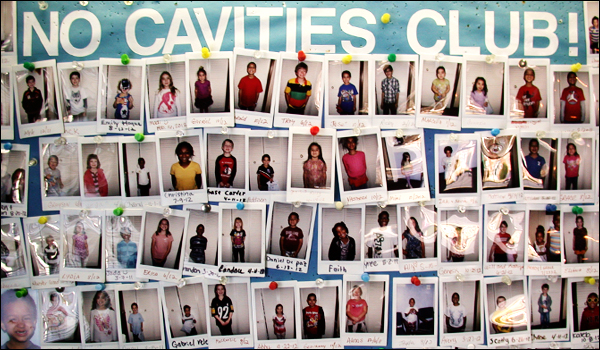For Kids!
Winner of the Bear

Each time your child visits for a dental appointment, they are added to the Winner of the Bear raffle. A name is drawn every three months, and the winner receives a free teddy bear like the one pictured here!
Proper dental care begins before a baby's first tooth appears. Just because you can't see the teeth doesn't mean they aren't there. Teeth actually begin to form in the second trimester of pregnancy. At birth, your baby has 20 primary teeth, some of which are fully developed in the jaw.
Running a damp washcloth over a baby's gums daily will help clear away harmful bacteria. Parents can brush kids' teeth as they come in with an infant toothbrush, using water with just a smear of toothpaste until about age 2.
Around age 2, most kids can spit while brushing. Use a pea-sized amount of toothpaste, with supervision, until around age 5.
Even babies can develop tooth decay if good feeding habits aren't practiced. Putting a baby to sleep with a bottle might be convenient, but can harm the baby's teeth. When the sugars from juice or milk remain on a baby's teeth for hours, they can eat away at the enamel, creating a condition known as "bottle mouth." Pocked, pitted, or discolored front teeth are signs of bottle mouth. Severe cases result in cavities.
No Cavities Club
Every child who is cavity-free gets their picture taken, and they become a part of our No Cavities Club!
Here are nine pieces of good advice that parents can follow to keep their children from getting cavities:
- Mothers should reduce their own oral bacterial infection through dental care and effective oral home care during prenatal and postnatal periods.
- Avoid propping a bottle in the crib.
- Avoid excessive nighttime bottle or breastfeeding.
- Try comforting the child with a pacifier or favorite toy or blanket instead of using the bottle or breast as a pacifier.
- If water is unfloridated, discuss fluoride drops or tablets with the dentist. Fluoride can be obtained with a prescription.
- Clean a child's teeth as soon as they erupt. Parents should use a damp cloth or a toothbrush to clean the teeth. Cleaning a child's teeth remains the parent's responsibility into the preschool years.
- Check teeth regularly for any chalky white or brown spots that could be the beginning of decay.
- Bring the child to the dentist whenever a dental problem is suspected.
- A child's first visit to the dentist should be made by age 3 or six months after the first tooth erupts, unless the parent suspects a problem with the teeth.
(Source: MedicineNet.com)
